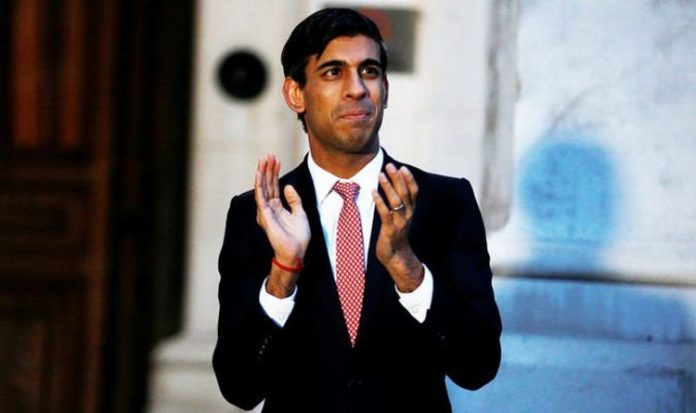The Chancellor’s stark message to newly elected Tory MP’s came as Boris Johnson warned them of “choppy waters” ahead as the country begins to recover from the coronavirus crisis. Mr Johnson said: “I know it’s been tough. I’ve got to warn you going it’s about to get tougher. The waters are about to get choppier. But we are going to deal with it.” Their remarks come amid disquiet among Conservative party ranks at the handling of the coronavirus crisis.
Many Tories are angry at the series of U-turns the Prime Minister has presided over during the pandemic and fear high taxes could be among the unpopular choices needed for the recovery.
There has been speculation that corporation tax could be hiked, capital gains tax increased, pension tax relief cut or aid spending reduced.
Each move would be controversial within wings of the party.
The Chancellor, who accidentally revealed the wording of his statement while holding his notes outside 11 Downing Street, urged the 2019 Tory intake to show trust to overcome the “short-term challenges” the party faces.
The Conservative Party, which won an 80-seat majority at December’s general election, has seen its opinion poll lead over Labour cut in recent weeks.
Mr Sunak told the MPs: “We will need to do some difficult things, but I promise you, if we trust one another we will be able to overcome the short-term challenges.
“Now this doesn’t mean a horror show of tax rises with no end in sight. But it does mean treating the British people with respect, being honest with them about the challenges we face, and showing them how we plan to correct our public finances and give our country the dynamic, low-tax economy we all want to see.”
He said the Conservatives “cannot, will not and must not surrender our position as the party of economic competence and sound finance”.
“If we argue instead that there is no limit to what we can spend, that we can simply borrow our way out of any hole, then what is the difference between us and the Labour Party,” he added.
UK borrowing is at an all-time high – hitting £2 trillion last month.
A lion’s share of this borrowing was used to fund the spiralling financial cost of coronavirus – including propping up workers with schemes for furloughed workers and the self-employed.
The Exchequer has also lost out on a massive amount of revenue from tax because of economic inactivity.
As part of the plan to help boost consumer spending, Mr Sunak slashed VAT to 5 percent – leaving a further dent in the Treasury’s coffers.
The Chancellor is also understood to be considering raising fuel duty by 5p to help get a grip of the nation’s debt problem.
Labour leader Sir Keir Starmer said he is opposed to tax rises at this time, instead calling on ministers to get the economy growing again.
His spokesman said: “With the health crisis still not under control and it’s been the deepest economic crisis we’ve faced in generations, this is absolutely the wrong time to be talking about tax rises.”
Mr Johnson yesterday refused to commit to extending the furlough scheme that has supported millions of people’s jobs through the coronavirus pandemic, despite warnings that unemployment is set to surge to levels last seen in the 1980s.
Economists, unions and lobby groups have warned that millions of people could be out of work by early next year unless the government extends its Job Retention Scheme beyond its current end date of October 31.
Mr Johnson told MPs that the furlough scheme has cost £40billion so far, adding: “What this government would rather do is get people into work through our Kickstart Scheme, which we are launching today, £2billion to help young people get the jobs they need.”
Under the scheme, employers will receive grants of £1,500 to provide six-month placements for people aged under 24.
But the Federation of Small Businesses warned this week that more government action is needed to prevent a “lost generation” of jobless young people.







